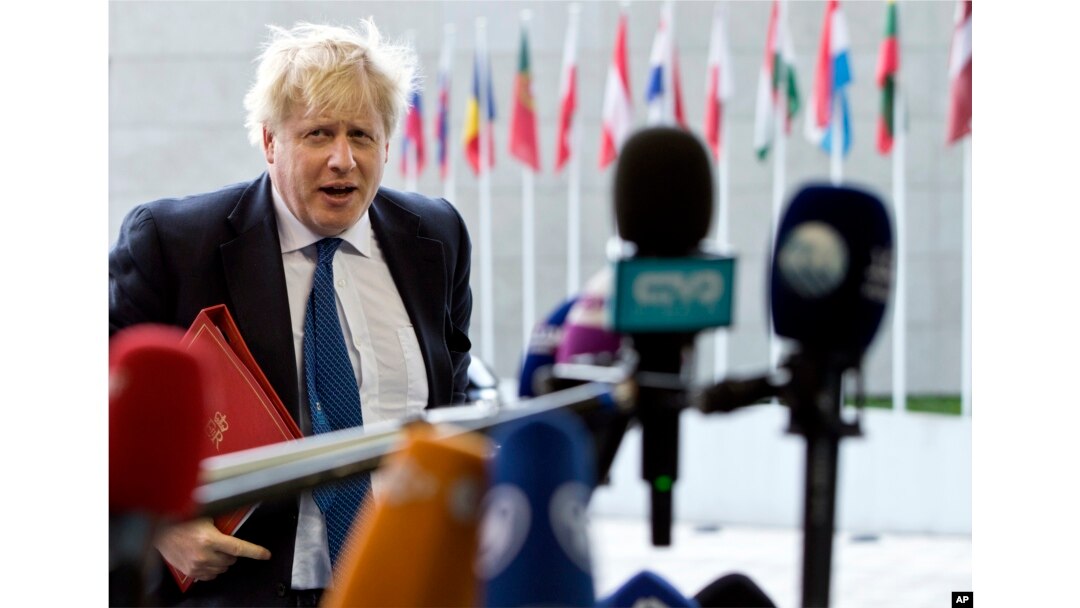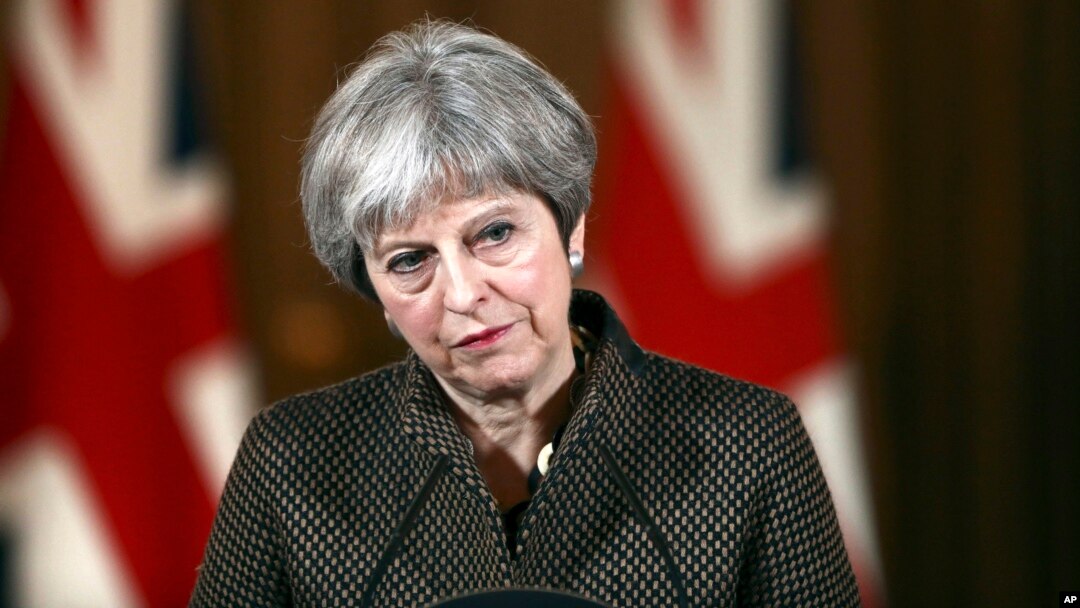British Prime Minister Theresa May invoked the recent poisoning of former Russian spy Sergei Skripal and his daughter in defending her decision to order British warplanes to take part in U.S.-led strikes against Syria without first seeking parliamentary approval.
She told a packed House of Commons that it was in the “national interest” to prevent future chemical attacks “within Syria, on the streets of the U.K. or elsewhere.” And she dismissed critics’ arguments that she was obeying U.S. instructions.
“We have not done this action because President Trump asked us,” she said. “We have done this because it was the right thing to do.”
She added, “This was not about intervening in a civil war, nor about regime change.” The aim, May said, was to degrade Syria’s chemical weapons stockpile with “limited, targeted and effective strikes” while guarding against triggering an escalation in the conflict and avoiding civilian casualties.

British Foreign Secretary Boris Johnson arrives for a meeting of EU foreign ministers at the EU Council building in Luxembourg, April 16, 2018.
Ready for cyber attack
Her statement came as British officials claimed that there had been a 20-fold jump in disinformation being spread by Kremlin-linked social media accounts since Saturday’s U.S.-led airstrikes on facilities Washington said were part of a Syrian government chemical weapons program.
Foreign Secretary Boris Johnson said Britain’s security agencies were prepared for a full-scale cyber attack targeting critical national infrastructure by Russia. He told the BBC that social media dirty tricks might be a prelude for more disruptive reprisals by the Kremlin — despite the fact that Russian President Vladimir Putin, in condemning Saturday’s airstrikes on his Syrian counterpart and ally, President Bashar al-Assad, indicated Russia might withhold from retaliating, saying, “History will set things right.”
The high risk that Saturday’s strikes might have provoked some kind of clash between Western and Russian forces, and still has the potential to do so, according to British officials, was illustrated they say, by an undersea cat-and-mouse game in the hours before the strikes involving a British submarine. A British Astute class sub was unable, they say, to launch missiles because it couldn’t maneuver into range as it was forced to evade a Russian sub and two frigates, which were hunting it.
A man rides past destruction in the town of Douma, the site of a suspected chemical weapons attack, near Damascus, Syria, April 16, 2018.
Attacks deemed legal
Prime Minister May’s defense of her decision came after government lawyers published an opinion saying the targeted strikes — aimed at punishing Assad for an alleged chemical weapons attack on a Damascus suburb —were legal.
The government’s top legal officers said the strikes were lawful because they were conducted on the grounds of overwhelming humanitarian necessity. May picked up on the official legal opinion and told lawmakers the strikes were “the right thing to do” to avert further suffering caused by chemical attacks, arguing, “There is broad-based international support for the action we have taken.” She cited the backing of other European governments and Gulf states.
The prime minister leads a minority Conservative government which is reliant on the support of a handful of Northern Irish lawmakers. She came under mounting pressure on Sunday from opposition leaders and some of her own lawmakers to allow a full Commons debate on the airstrikes, forcing the government to agree to an emergency debate, set to take place Tuesday.
Jeremy Corbyn, the leader of Britain's Labor Party attends the BBC's Marr Show in London, April 15, 2018.
War Powers Act?
Opposition Labor leader Jeremy Corbyn is seeking to maneuver the debate into one that will permit a vote — and he is seeking to introduce a War Powers Act that will require British governments in the future to secure parliamentary approval before ordering military action.
Nothing legally requires British governments to do so currently, but since 2003, when then-Prime Minister Tony Blair asked parliament to vote on participating in the U.S.-led invasion of Iraq, all subsequent governments have given the House of Commons a say.
May’s decision not to do so was partly determined, government sources concede, by her fear that she could lose the vote like her predecessor David Cameron did in 2013, when he sought parliament’s agreement to participate in a possible U.S.-led military strike on Syria. The withholding of British support then is thought to have contributed to then-U.S. President Barack Obama’s decision to stay his hand and not enforce his “red line” on the use of chemical weapons by the Assad government.
May said she didn’t avoid asking parliament for pre-approval because she feared losing a vote. “The speed with which we acted was essential in cooperating with our partners to alleviate further human suffering and to maintain the vital security of our operations. We have always been clear the government has the right to act in the national interest,” she said.
Demonstrators take part in a protest organized by the Stop the War coalition against the British government carrying out airstrikes on targets in Syria, in Parliament Square, London, April 16, 2018.
May ‘accountable’
In a session that was at times was rowdy, Corbyn told May that she is “accountable to this parliament and not to the whims of an American president.” He said, “I believe the action was legally questionable,” arguing the Charter of the United Nations only allows countries to act militarily for self-defense purposes or when authorized by the U.N. Security Council.
He also disputed the humanitarian motivations of the government, arguing Britain is supplying Saudi Arabia, despite allegations that the Saudi military is using cluster and phosphorous bombs in Yemen. Did that mean, he said, Saudi Arabia could be bombed as “punishment?”
The prime minister said, “We cannot go back to a world where the use of chemical weapons becomes normalized.” She said Corbyn’s plan of going through the U.N. for action in Syria every time “would mean a Russian veto on our foreign policy.”
Lawmakers frustrated
Some moderate Labor lawmakers broke ranks with their leader, as disquiet mounted in opposition ranks about the thrust of Corbyn’s attack on May. Party critics argued he had misread the mood of the House of Commons, which they said is supportive of the action taken against Syria but frustrated that prior parliamentary approval wasn’t sought.
British parliament member Mike Gapes holds a news conference in Baghdad, Jan. 24, 2006.
“There is a long-standing and noble tradition on these benches of supporting humanitarian intervention and the responsibility to protect,” said Labor lawmaker Mike Gapes, who has accused Corbyn of being an apologist for Russia and Assad.
Another Labor lawmaker took aim at Corbyn, accusing him of turning a blind eye “in pursuit of some moral high ground,” adding “a policy of inaction would also have severe consequences.”
For rebels, strike too limited
As May made her statement to the Commons, Syrian rebel leaders raised questions about the effectiveness of the Western airstrikes.
They said the airstrikes were too limited and that Assad’s chemical warfare capability has not been crippled. According to a former Syrian general who once oversaw chemical warfare units in Syria's 5th army division, the U.S. and its European partners missed strategic sites, including a depot at Taqsis in the province of Homs.
“Taqsis is what we wanted to be hit,” said Gen. Zaher al-Sakat, who defected in 2013 to the rebels. "As long as it’s still functioning, then they’ll still have chemical weapons and the ability to provide more,” he added.


